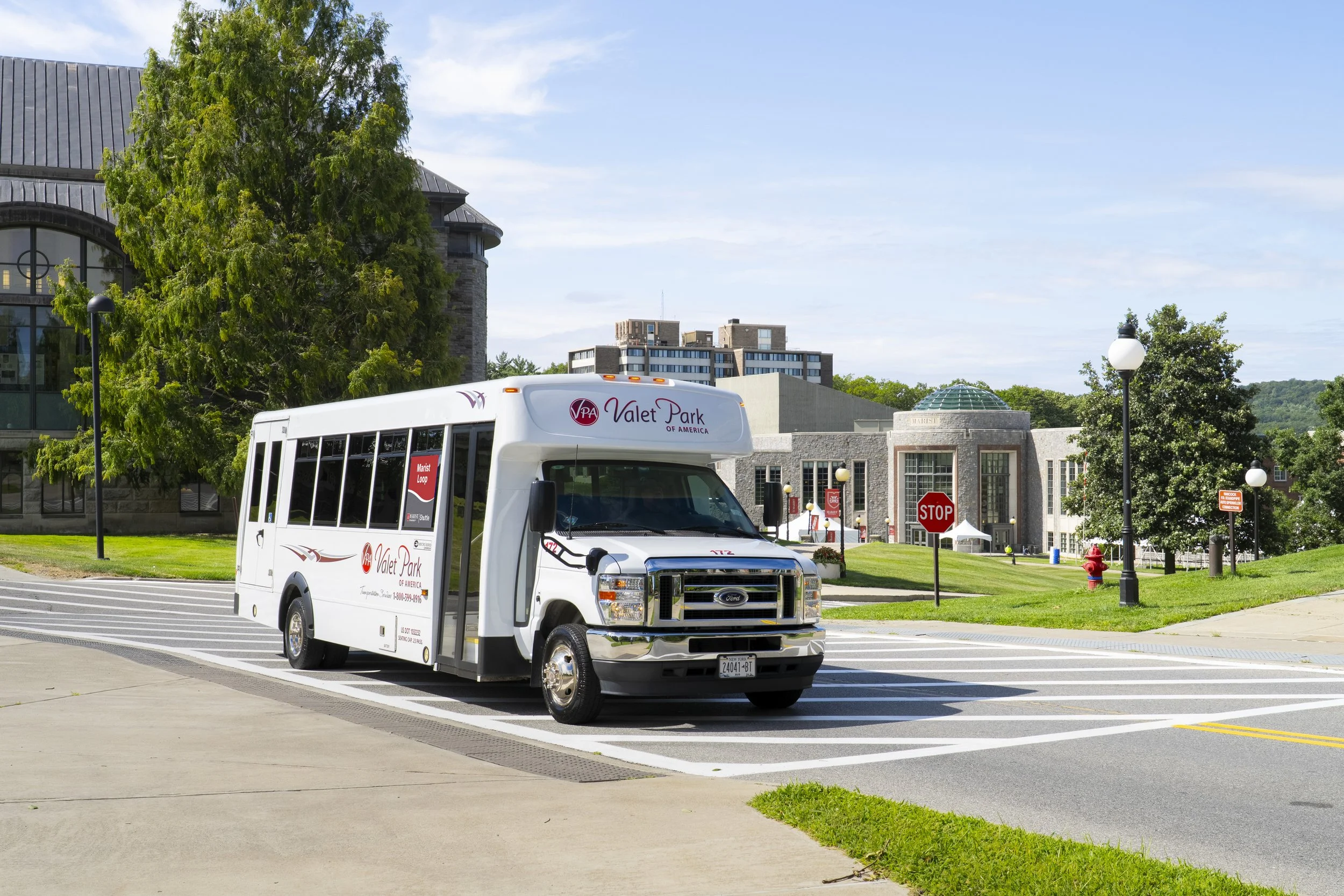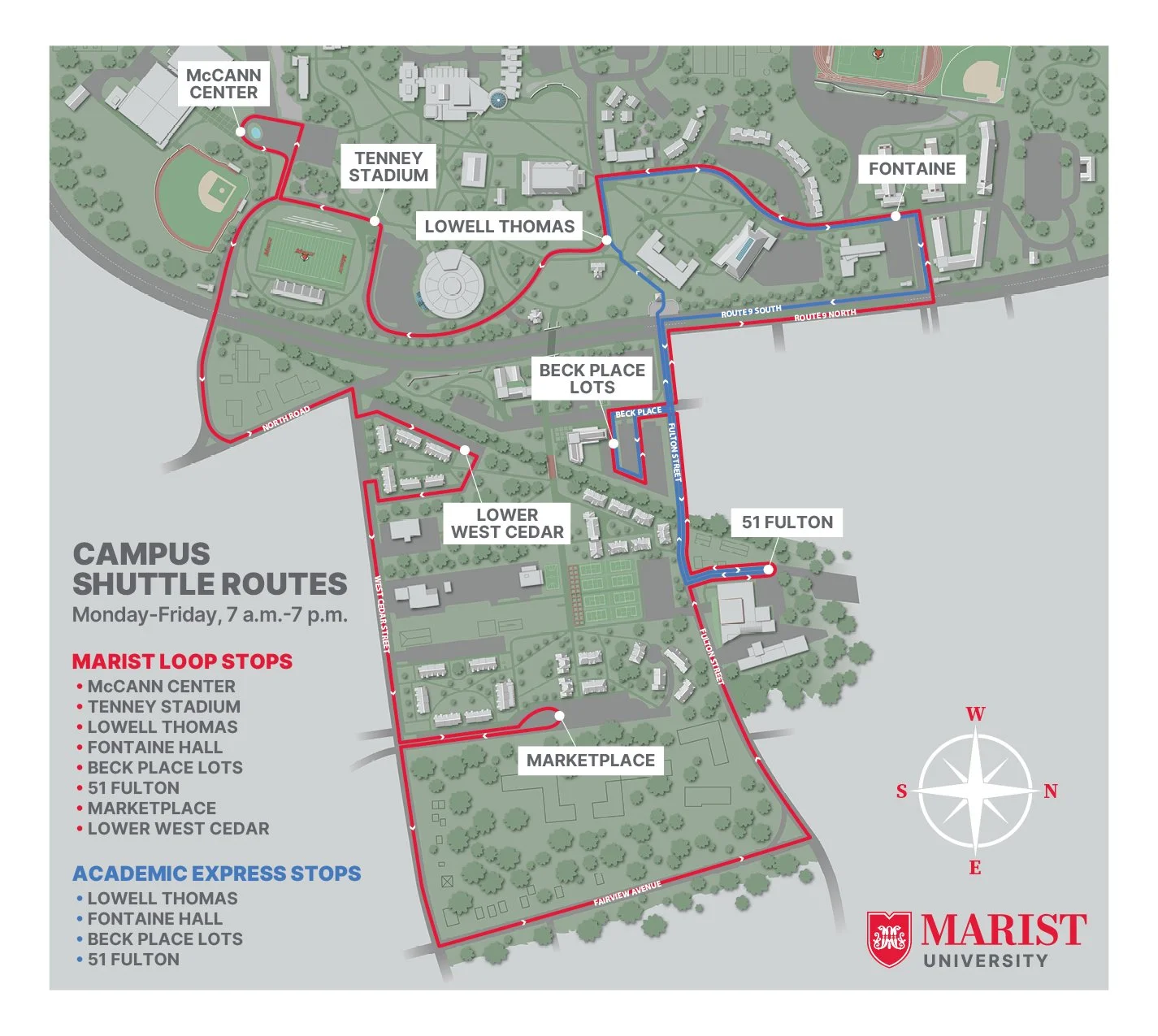New Shuttle Connects Campus
The new Marist University shuttle stops in front of Hancock on the Academic Express loop. Photo courtesy of Daniel Gough.
A shuttle will connect the east and west sides of campus this fall as part of changes addressing parking issues at Marist University. Starting Aug. 25, the two 24-passenger shuttles will run Monday to Friday from 7 a.m. to 7 p.m.
“Our hope is that [the shuttle] helps with parking and reduces the driving culture on campus,” said Director of Safety and Security Daniel Gough.
Student parking permits now cost $50 per semester instead of being free. Students will also be assigned to east or west parking lots depending on their housing location. All commuter students are assigned to the east campus lots.
Ever since Gough announced these changes in an email on Aug. 4, some students have been apprehensive about the cost and effectiveness of the plan.
“That's my biggest concern, because I don't want to have wasted money if I'm going to end up spending 10 minutes or 20 minutes driving around looking for a parking spot,” said Dani Parsons ‘26.
However, Gough is very optimistic about the plan.
“I'm confident that there will be a space on campus for every student, faculty and staff member under this plan because we've de-densified campus,” Gough said. “Everybody was trying to park in the same lots.”
Safety and Security spent the last academic year meeting with the Student Government Association, conducting drone surveys and holding focus groups and information sessions. The two four-week-long drone surveys provided valuable information about parking patterns.
“What [the data] told us was that there was actually enough parking [spots] on the campus as a whole, if we were able to distribute the parking on campus. So that's really the approach behind this, with the understanding that if students are parking on east campus, they would likely want to have a form of transportation to take them over to west campus,” Gough said.
The continuous shuttles provide transportation across campus. The Academic Loop takes six minutes on average and connects Lowell Thomas, Fontaine Hall, Beck Place Lots and 51 Fulton. The Marist Loop takes around 16 minutes and travels the perimeter of Marist’s campus. The shuttles can be live-tracked from the new Marist Safe app.
Campus Shuttle Routes. Graphic via Office of Campus Safety.
Parking Location Map. Graphic via Office of Campus Safety.
The shuttles will also replace daytime golf cart mobility transport by Marist Security’s Student Nighttime Auxiliary Patrol (SNAP). SNAP will still provide rides for students in need from 7 p.m. to 11 p.m.
Frank Fontana ‘27 is concerned about the new plan designating commuter parking to the east campus. This semester, Fontana is taking three night classes to accommodate his work schedule. By the time his classes are over, the shuttle will have stopped running.
“We do make up a small population of the school, but we still are part of the school, and I feel like even though our needs aren't as big as residents or student athletes, we should have at least some sort of parking that's close,” Fontana said.
When Fontana contacted the Office of Safety and Security, he was asked to give a two-week grace period. Additionally, commuter students are permitted to park in faculty and staff lots on the west campus between 4:30 p.m. and 8 a.m.
Many students like Fontana have been disappointed with the new cost of the parking permit in addition to other financial burdens.
“I thought that it was nice that Marist was kind of like a needle in the haystack, where they didn't make their students pay,” Fontana said.
The change is also jarring to students like Parsons.
“I know a lot of other campuses do charge for a permit, but as someone who's going to be a senior and has had parking for free since sophomore year, it just seems pointless to me,” he said.
Despite this, Safety and Security found different sentiments in the students they asked during the focus groups and information sessions.
“We asked countless times what students thought about a permit fee. And every single time, everybody said: ‘We would be okay with a nominal parking permit fee if it fixed the situation,’” Gough said.
According to Gough, the money from the parking permits is used to help address the parking issues.
“It's a standard practice at higher institutions, and that's funding the shuttle systems and other parking improvements that we've done,” Gough said. “We repaved a couple of lots, all of Midrise got repaved and most of Riverview. We have new parking signage up on campus. We did improvements with handicapped signage.”
Through this transition to a new system, Gough is sure the campus community will benefit from these changes.
Gough said, “I'm sure there are some people who are probably dissatisfied … but again, I'm confident, once they see this working and how student-oriented it is and user-friendly, they're gonna be very pleased.”


